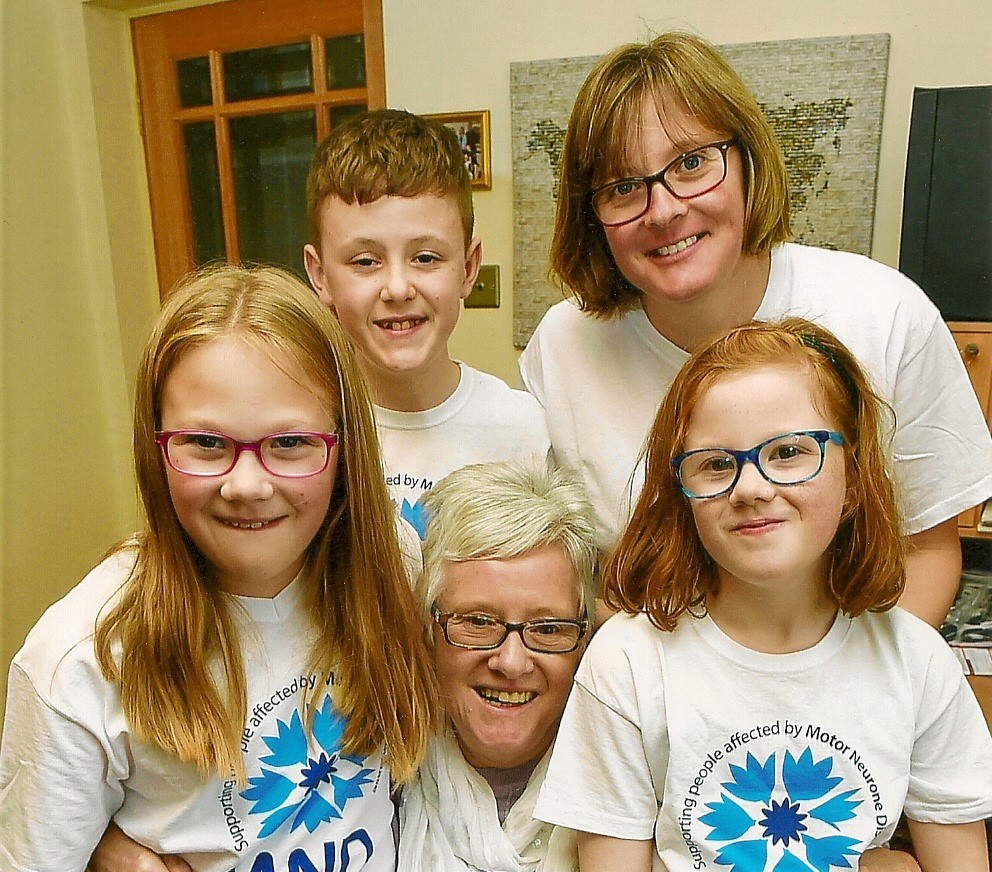What is MND
Find support
I have MND
I am supporting someone
Get involved
Research
About MND Scotland
What’s new?
© MND Scotland 2026
© MND Scotland 2026

The grandmother of five is married to Ian (68) and has two children; Andrew (41) and Fiona (39), and is a retired nurse and care home manager.
Anne, who is a self-confessed chatterbox, first noticed symptoms in March 2014. MND is a rapidly progressing terminal illness, which stops signals from the brain reaching the muscles. This may cause someone to lose the ability to walk, talk, eat, drink or breathe unaided.
She said, “A friend noticed I had lost weight and my speech wasn’t right but I just made excuses for the reason. My family thought when I was tired my speech wasn’t good but thought it was due to previous facial paralysis.
“People thought I had had a stroke and others thought I had a drink problem, which we thought was rather amusing as I don’t drink.
“I went to the doctors just before Christmas 2014 because of mucus in my throat and he noticed my speech was slurred. He checked me for a stroke and did blood tests, then referred me to the neurologist, who I saw in January 2015. I had an MRI scan, nerve tests and genetic testing. He had said MND was a possibility but needed to do these tests before a final diagnosis could be made. In the meantime, he sent me to a Speech and Language Therapist.
“I was officially diagnosed with MND in October 2015. I just accepted it and asked what happens now? He said an MND nurse will visit and support me, and that he would see me regularly. It’s frustrating at times not being able to speak. I can’t type as quickly as I think or could speak. But I was not going to sit down to it, as I still had (and have) a lot of living to do and a lot to live for.
“I love going out and meeting friends, and MND hasn’t stopped me doing this. My family would say I’m never in. I go out for coffee, shopping, to the theatre, spa days and holidays. I go on the train myself to visit my son and his family in Somerset.”
Anne has received lots of support from friends, family and the charity, MND Scotland.
“My family have been very supportive and we can even laugh about it. My grandchildren understand what’s happening and although they have been upset by it, we can also laugh about it; they are very protective of me.
“I receive complementary therapy through MND Scotland and I attend their support group, which meets every few months in Dumfries in The Usual Place. What would be nice, is if people in the local community would support the group and help the public to understand the disease better, and stop misconceptions.”
This MND Awareness Week we launched a new campaign to raise awareness of the stigmas and misconceptions faced by those affected by MND.
Anne said, “Most people just treat me as always but some assume as I can’t speak that I can’t hear either. It is the same as being in a wheelchair, people speak to the person pushing it. The biggest misconception is that I should not be out as I am going to die – aren’t we all?
“I am very fortunate; I have very some very good friends who support me and still see me as me and not Anne with MND who can’t speak. Every MND patient is different and copes in their own way and the symptoms vary.
“I feel people should be aware of this illness so there are no misconceptions, and so people also know one can still have a life with it. That’s why I am sharing my story.”
Click here to find out more about our Myth-Busting MND campaign.
Sign up
for newsletter
Get the latest news and events straight to your inbox.
You can help create a world without MND